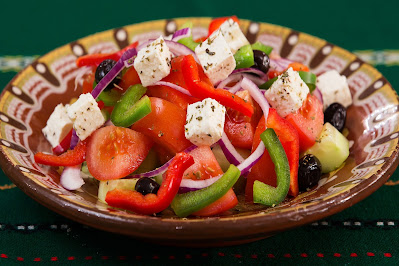A Mediterranean Diet:120 Common Foods
Olive oil
Tomatoes
Feta cheese
Kalamata olives
Greek yogurt
Eggplant
Red peppers
Hummus
Chickpeas
Garlic
Onion
Basil
Oregano
Rosemary
Thyme
Lemon
Oranges
Grapefruit
Fennel
Artichokes
Spinach
Arugula
Radicchio
Zucchini
Squash
Broccoli
Cauliflower
Carrots
Sweet potatoes
Potatoes
Red onion
Green onion
Cucumber
Celery
Mushrooms
Green beans
Asparagus
Lentils
Quinoa
Brown rice
Whole grain bread
Whole grain pasta
Barley
Bulgur
Couscous
Pita bread
Almonds
Walnuts
Pistachios
Hazelnuts
Pine nuts
Cashews
Sesame seeds
Sunflower seeds
Pumpkin seeds
Sardines
Anchovies
Salmon
Tuna
Mackerel
Swordfish
Shrimp
Clams
Scallops
Octopus
Calamari
Chicken
Turkey
Lamb
Beef
Veal
Pork
Duck
Eggs
Milk
Cheese
Yogurt
Cottage cheese
Soy milk
Tofu
Avocado
Watermelon
Cantaloupe
Honeydew
Strawberries
Blueberries
Blackberries
Raspberries
Grapes
Apples
Pears
Peaches
Plums
Cherries
Oranges
Grapefruit
Lemons
Pomegranate
Dates
Figs
Prunes
Raisins
Honey
Maple syrup
Balsamic vinegar
Red wine vinegar
Apple cider vinegar
White wine vinegar
Dijon mustard
Hot sauce
Salsa
Tomato sauce
Pesto
Tahini
Harissa
Za'atar
Sumac
Cumin
Paprika
Turmeric
Keep in mind that this list is not exhaustive, and there are many other foods that can be incorporated into a Mediterranean diet. The key is to focus on whole, minimally processed foods that are rich in nutrients and flavor.
Exercises, Diet, Workout and Tips on How to Reduce My Waist, How to Lose Weight, How to Lose Belly Fat, Weight Loss Tips, Belly Fat Diet, Exercises to Lose Belly Fat, Healthy Weight Loss, Reduce Tummy, Waist and Stomach and Waist Slimming Exercises.
Monday 27 February 2023
120 Common Foods Of A Mediterranean Diet
A 3-Meal 7-Day Mediterranean Diet Plan
A 3-Meal 7-Day Mediterranean Diet Regime
Here is an example of a 3-meal, 7-day Mediterranean diet plan:
Day 1:
Breakfast: Greek yogurt with fresh berries and honey, whole grain toast with avocado and tomato slices.
Lunch: Grilled chicken breast with mixed greens, cucumber, and tomato salad dressed with olive oil and lemon juice.
Dinner: Baked salmon with roasted vegetables (such as zucchini, bell peppers, and onions) drizzled with olive oil and sprinkled with herbs.
Day 2:
Breakfast: Omelette with spinach, tomato, and feta cheese, whole grain toast.
Lunch: Greek salad with mixed greens, cherry tomatoes, cucumber, olives, and feta cheese dressed with olive oil and red wine vinegar.
Dinner: Grilled lamb chops with roasted potatoes and green beans, seasoned with garlic and rosemary.
Day 3:
Breakfast: Whole grain cereal with almond milk, sliced banana, and chopped nuts.
Lunch: Tuna and white bean salad with mixed greens, tomatoes, and red onion dressed with olive oil and lemon juice.
Dinner: Whole wheat spaghetti with tomato sauce, sautéed garlic shrimp, and a side salad.
Day 4:
Breakfast: Scrambled eggs with sautéed spinach and mushrooms, whole grain toast.
Lunch: Chickpea and vegetable stew with crusty whole grain bread.
Dinner: Grilled chicken skewers with mixed vegetables (such as bell peppers, onions, and mushrooms), served with whole grain couscous.
Day 5:
Breakfast: Greek yogurt with fresh berries and honey, whole grain toast with almond butter.
Lunch: Grilled vegetable sandwich with hummus and whole grain bread, side salad.
Dinner: Baked white fish (such as cod or tilapia) with roasted asparagus and cherry tomatoes, drizzled with olive oil and lemon juice.
Day 6:
Breakfast: Smoothie with Greek yogurt, frozen berries, banana, and almond milk.
Lunch: Whole wheat pita stuffed with falafel, hummus, and vegetables (such as tomato, cucumber, and lettuce).
Dinner: Grilled steak with roasted sweet potatoes and a side salad.
Day 7:
Breakfast: Whole grain pancakes with fresh fruit and maple syrup.
Lunch: Greek salad with mixed greens, cherry tomatoes, cucumber, olives, and feta cheese dressed with olive oil and red wine vinegar.
Dinner: Ratatouille (a stew of eggplant, zucchini, bell peppers, onions, and tomatoes) with a side of crusty whole grain bread.
Remember, this is just one example of a Mediterranean diet plan, and there are many different variations and options to choose from. Be sure to incorporate a variety of fruits, vegetables, whole grains, legumes, and healthy fats into your meals, and enjoy the delicious flavors of this healthy and sustainable way of eating.
Advantages Of A Mediterranean Diet In Weight Loss
The Mediterranean diet is a way of eating that is based on the traditional dietary patterns of countries bordering the Mediterranean Sea, such as Greece, Italy, and Spain. It is characterized by a high consumption of fruits, vegetables, whole grains, legumes, nuts, and olive oil, moderate intake of fish and dairy products, and low consumption of red meat and processed foods.
The Mediterranean diet has been extensively researched and has been found to have numerous health benefits, including weight loss. Here are some advantages of the Mediterranean diet in weight loss:
High in fiber: The Mediterranean diet is rich in fiber from fruits, vegetables, whole grains, and legumes. High-fiber foods keep you feeling full for longer, reducing your appetite and helping you eat less.
Low in processed foods: The Mediterranean diet emphasizes whole, minimally processed foods over highly processed ones. Processed foods are often high in calories, sugar, and unhealthy fats, and can lead to weight gain over time.
Rich in healthy fats: The Mediterranean diet is high in monounsaturated and polyunsaturated fats, found in olive oil, nuts, and fatty fish like salmon. These healthy fats can help you feel full, reduce inflammation, and improve cholesterol levels.
Promotes balanced meals: The Mediterranean diet emphasizes a balance of macronutrients, with moderate amounts of protein and healthy fats and a focus on complex carbohydrates like whole grains and vegetables. This balanced approach can help you maintain a healthy weight over the long term.
Emphasizes mindful eating: The Mediterranean diet is not just about what you eat, but how you eat. The diet emphasizes mindful eating, savoring each bite, and paying attention to hunger and fullness cues. This approach can help you avoid overeating and make healthier food choices.
May reduce inflammation: The Mediterranean diet is rich in anti-inflammatory foods like fruits, vegetables, and fatty fish. Chronic inflammation has been linked to obesity and other health problems, so reducing inflammation may help with weight loss.
May improve gut health: The Mediterranean diet is high in fiber and fermented foods like yogurt and kefir, which can improve gut health. A healthy gut microbiome has been linked to a healthy weight.
Sustainable and enjoyable: One of the key advantages of the Mediterranean diet is that it is a sustainable way of eating that can be enjoyed for a lifetime. Unlike fad diets that may lead to short-term weight loss followed by weight gain, the Mediterranean diet is a healthy and balanced approach to eating that can be sustained over the long term.
The Mediterranean diet is a healthy and sustainable way of eating that can lead to weight loss. Its emphasis on whole, minimally processed foods, healthy fats, and mindful eating can help you feel full, reduce inflammation, and make healthier food choices. Incorporating the Mediterranean diet into your lifestyle may not only help you lose weight but also improve your overall health and well-being.


